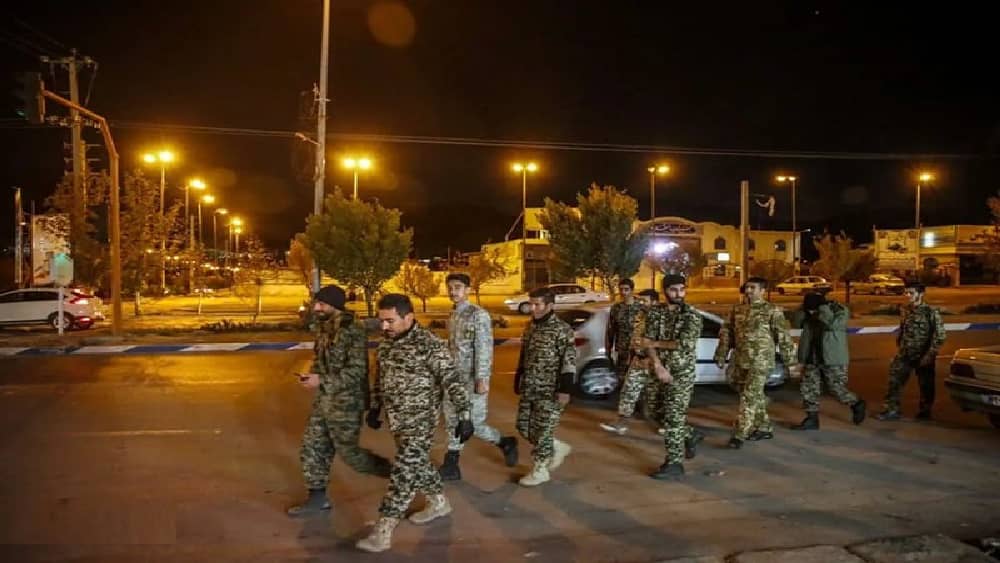Facebook
Twitter
LinkedIn
Pinterest
Reddit
Email
Print
 Basij paramilitary forces patrol the streets at night amid heightened security crackdowns across Iranian cities – July 2025
Basij paramilitary forces patrol the streets at night amid heightened security crackdowns across Iranian cities – July 2025
Three-minute read
As it loses its grip over the increasingly restless society, the Iranian regime is scrambling to reestablish control over its discredited and fractured security apparatus. The IRGC-affiliated Fars News Agency confirmed the formation of a new entity—the “Defense Council”—as part of what it calls a “new governance model” in the fields of defense and national security in the wake of the recent 12-day conflict.
According to Fars, the new council will undertake “strategic missions in the field of the country’s defense policies,” though details remain vague. This move comes on the heels of reports by Nournews, a media outlet closes to the Supreme National Security Council (SNSC), which warned on August 1 that structural changes in top-level security institutions were imminent.
Despite these changes being framed as reforms, the reality is far more sinister. The regime is not building new institutions to protect the Iranian people—it is creating new tools to suppress them.
#Iranian Regime Faces Internal Security Breach Amid Power Consolidation Drivehttps://t.co/MA8MfQI1Lk
— NCRI-FAC (@iran_policy) July 19, 2025
A Council to Defend the Regime, Not the Nation
Following major intelligence and operational failures during the war, the regime’s Supreme Leader Ali Khamenei has reportedly lost trust in his military leadership and is seeking to centralize control by inserting loyal operatives deeper into every tier of the defense and intelligence structure.
But this is not a strategy of reform—it’s a strategy of survival.
The regime continues to drain national resources on nuclear weapons development and foreign proxy groups. This obsession with ideological warfare comes at the direct expense of Iran’s infrastructure and civilian needs. As water shortages escalate in cities across the country, public anger is growing. Even Tehran, home to nearly ten million residents, faces imminent water scarcity. Iranians increasingly condemn the regime for squandering billions on weapons, militias, and uranium enrichment while neglecting the collapsing public infrastructure they rely on.
Now, fearing a public uprising, the regime is cracking down violently—suppressing dissent street by street and prison by prison.
#Iran: Why Was SNSC Chief Ali Shamkhani Replaced With Ali Akbar Ahmadian? https://t.co/pVqGGXrwbq
— Ali Safavi (@amsafavi) May 27, 2023
Endless Repression: The Regime’s True Defense Doctrine
The Defense Council’s formation coincides with an alarming surge in state violence. In recent weeks, security forces have arrested countless citizens—along with dual nationals and foreigners—under the familiar charges of “espionage” and “infiltration.” These arrests are rarely followed by real investigations. Instead, they become part of a pattern of terror: five-minute show trials, swift executions, and systemic torture.
The Iranian people live under the shadow of a system where the executioner is always at work. Special prison squads raid the cells of political prisoners, brutally beat them, cover their heads, and vanish them into unknown locations. Families are left in the dark. The disappeared often never return.
This is the true face of the Iran regime’s defense strategy—not sovereignty, but fear.
#Tehran’s War Fallout Exposes a Cornered Regime Gripped by Fear, Crackdown, and Global Isolationhttps://t.co/tE9tEIP6H5
— NCRI-FAC (@iran_policy) July 1, 2025
The Return of Larijani: Recycling the Old Guard
As the regime reshuffles its security elite, Fars reports that Ali Larijani, a former Secretary of the SNSC and close advisor to Khamenei, is expected to return to that position
Meanwhile, the current secretary, Ali Akbar Ahmadian, will reportedly be tasked with “special and strategic cases,” another vague designation meant to obscure rather than clarify.
These rotations do not signal progress. They reflect desperation. The regime is recycling familiar loyalists, not because they offer solutions, but because there is no one left to trust. In the aftermath of the war, several key commanders were killed, and the leadership vacuum is growing. The Defense Council is not a response to this crisis—it’s a distraction from it.
What the regime fears most is not an external enemy—it is the Iranian people. And what it defends most aggressively is not the nation—but its own survival. No new institution can change this reality.